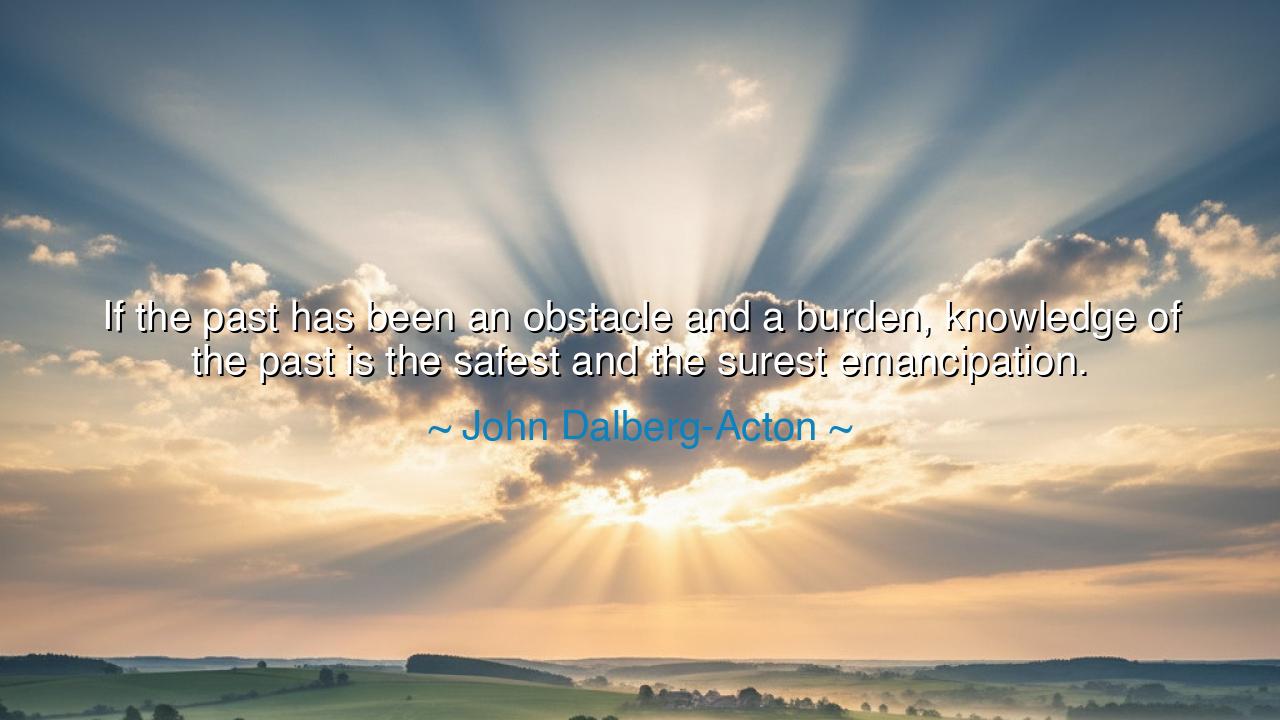
If the past has been an obstacle and a burden, knowledge of the
If the past has been an obstacle and a burden, knowledge of the past is the safest and the surest emancipation.






The historian and moral philosopher John Dalberg-Acton, known to the world as Lord Acton, once wrote these immortal words: “If the past has been an obstacle and a burden, knowledge of the past is the safest and the surest emancipation.” In this single sentence lies the essence of wisdom itself—the power of truth remembered. Acton reminds us that though the past may wound us, though it may weigh heavily upon the conscience of nations and men, it is not ignorance but understanding that sets us free. To know the past is not to be enslaved by it; it is to unshackle oneself from its chains by seeing it clearly and wholly.
Lord Acton, who lived in the nineteenth century, was not only a scholar of history but a guardian of liberty. He believed that freedom and truth were bound together, that the one could not live without the other. His study of history revealed to him a solemn pattern—that power unchecked leads to corruption, and that societies perish when they refuse to confront their own mistakes. His famous saying, “Power tends to corrupt, and absolute power corrupts absolutely,” flows from the same fountain as this quote. When he spoke of the knowledge of the past as emancipation, he spoke as one who had seen the tragedy of willful ignorance—the blindness of those who choose to forget the sins of yesterday, and by forgetting, doom themselves to repeat them.
To Acton, the past is not an enemy—it is a mirror. It may reflect darkness, but that reflection is the first light of understanding. The past becomes an obstacle when it is denied, and a burden when it is carried without reflection. But when studied—when examined with humility and courage—it becomes a guide, showing where humanity has stumbled and where it has soared. In knowing our history, we learn both the folly of tyranny and the triumph of virtue. We are reminded that no nation, no people, no soul is condemned to the mistakes of its forebears, if only it dares to look backward with open eyes.
Consider the example of Germany in the aftermath of the Second World War. The horrors of that era—the war, the Holocaust, the tyranny of totalitarian power—could have been buried in shame and silence. Yet instead, the German people confronted their past with courage and honesty. They studied it, memorialized it, taught it to their children, and vowed never again to repeat it. Through knowledge of their past, they found the strength to build a new nation founded on justice and democracy. Their repentance became their rebirth. In this, Acton’s truth stands revealed: knowledge of the past is the surest emancipation—not only for individuals, but for entire civilizations.
There are others, however, who flee from history, who would rather erase it than understand it. They believe that forgetting is freedom, that silence is peace. But ignorance is a false peace—it is the stillness before the storm. The past, unacknowledged, festers beneath the surface, shaping the present in unseen ways. To deny the past is to live enslaved by its shadow. Only by bringing it into the light—by studying it, naming it, and learning from it—can one truly walk forward unbound. As Acton understood, the courage to remember is the foundation of moral progress.
O listener, take this lesson deeply into your heart: never fear the truth of your past. Whether personal or collective, the story of where you have been is not your prison—it is your map. To know it is to know yourself; to face it is to claim your freedom. Study your history, your failures, your pain, for these are the stones upon which wisdom is built. What you have endured becomes strength when it is understood, and what you have learned becomes light when it is shared.
Thus, the teaching of Lord Acton rings as clear today as in his time: the past, when known, ceases to be a master and becomes a teacher. The man or nation that remembers rightly grows wise, but the one that forgets grows fragile. Let us therefore honor our history—not to glorify it, but to learn from it. Let us look upon its tragedies with humility, and its triumphs with gratitude. For knowledge of the past is not a burden to carry, but a key to freedom—a light that reveals the path forward through the long corridors of time.
And so, remember this: if the past stands before you like a wall, study it until it becomes a door. For in the end, it is only through the knowledge of the past that mankind may find its emancipation—its liberation from ignorance, from fear, and from the endless repetition of its own mistakes.






AAdministratorAdministrator
Welcome, honored guests. Please leave a comment, we will respond soon